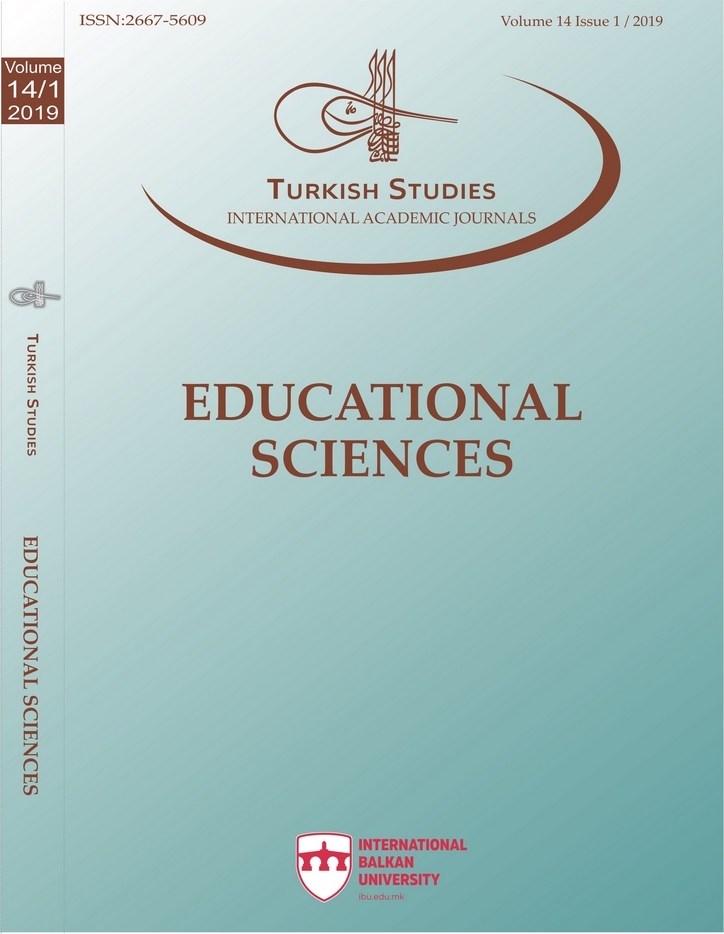TEACHER CANDIDATES’ OPINIONS ON INCLUSIVE EDUCATION PRACTICES
Inclusive education model is defined by UNESCO as an education model which involves the processes of respecting the variety of needs of learners, contributes to the participation of learners to the culture and society and helps alleviate discrimination within the educational system. This education model includes all the necessary changes in terms of objectives, content, learning conditions and strategies to be developed, for the purpose of establishing suitable conditions for all children in learning process and taking needed precautions. Although inclusive education was developed towards students with physical disabilities at the beginning, by time this concept has been expanded to cover all the students including those who do not know languages, those having mental problems, immigrants, refugees, the disabled, ethnical and religious minorities, and students having diseases such as AIDS and those with all kinds of problems. The objective of this study is to determine the opinions of teacher candidates studying on education faculty about inclusive education practices with respect to some demographic variables. The working group of the research is formed by students studying in various departments of Education Faculty of Hatay Mustafa Kemal University from the education year of 2018-2019. Inclusive Education Practices Scale was used in the research to collect the views of teacher candidates. The research revealed that teacher candidates pay particular attention on socializing and bonding students, improving their creativity, and helping them involve in educational tasks by themselves; teacher candidates would prefer communicating with students verbally rather than handing out materials, they would act based on the conditions and momentary situation of the class rather than based on the fixed methods and would not assign homework to students unless necessary.
___
Allan, J. (2010). “The sociology of disability and the struggle for inclusive education.”British Journal of Sociology of Education,31: 603-619.Altan, S. (2019). “Herkes için kapsayıcı eğitim.” Eleştirel Pedagoji,60: 1-10.
Ayan-Ceyhan, M. (2016). Kapsayıcı eğitim: okul pratikleri, öğretmen ihtiyaçları. ERG. http://www.egitimreformugirisimi.org/wpcontent/uploads/2017/03/ERG_KapsayiciEgitim_OgretmenIhtiyaclari.pdf Erişim Tarihi: 09.06.2019.
Aytekin, S. (2017). Sınıfında yabancı uyruklu öğrenci bulunan öğretmenler için el kitabı.Ankara: MEB Yayınları.
Baş, M. & Sarıgöz, O. (2018). “Determining the readiness levels of pre-service teachers towards mobile learning in classroom management.” Educational Research and Reviews, 13(10): 382-390.
Beverly, R. (1992). “The effecets of full inclusion on regular education teachers.” Office of Special Education and Rehabilitative Services, 9: 1-55.
Creswell, J.W. (2003). Research design: Qualitative, quantitative, and mixed methods approaches.Thousand Oaks, CA: Sage.
Çağlar, S. (2009). Uluslararası hukuk ve Türk hukuk sisteminde engellilerin eğitim hakkı ve devlet yükümlülükleri.Yayımlanmamış doktora tezi, Marmara Üniversitesi Sosyal Bilimler Enstitüsü, İstanbul.
Çelik, R. (2017). “Adalet, kapsayıcılıkve eğitimde hakkaniyetli fırsat eşitliği.” Fe Dergi,9(2): 17-29.
Graham, L.J. & Slee, R. (2006). Proceedings from American Educational Research Association (AERA) 2006 Annual Conference:Inclusion? In Proceeding Disability Studies in Education Special Interest Groups.San Francisco, CA.
Herdem, F.S. & Bozgeyikli, H. (2013). “İlköğretime devam eden parçalanmış ve tam aile çocuklarının rehberlik ihtiyaçlarının karşılaştırmalı olarak incelenmesi.” OPUS-Türkiye Sosyal Politika ve Çalışma Hayatı Araştırmaları Dergisi, 3(4): 7-35.
Hoban, M.A. (1 999). The effects of inclusion on general education students.Unpublished doctoral dissertation, Boston College, Massachusetts.
Johnson, R.B. &Onwuegbuzie, A.J. (2004). “Mixed methods research: A research paradigm whose time has come.” Educational Researcher, 33(7): 14-26.
Karasar, N. (2010). Bilimsel araştırma yöntemi.Ankara: Nobel Yayın Dağıtım.
Mfuthwana, T. & Dreyer, L.M. (2018). “Establishing inclusive schools: Teachers’ perceptions of inclusive education teams.” South African Journal of Education, 38(4): 1-10.
Miles, S. & Singal, N. (2010). “The education for all and inclusive education debate: conflict, contradiction or opportunity?.” International Journal of Inclusive Education, 14(1): 1-15.
Oral, I. (2016). Türkiye’de kapsayıcı eğitimi yaygınlaştırmak için politika önerileri. ERG. http://www.egitimreformugirisimi.org/wp-content/uploads/2017/03/ERG_KapsayiciEgitim_ PolitikaOnerileri.pdfErişim Tarihi: 10.06.2019.
Önder, E. & Güçlü, N. (2014). “İlköğretimde okullar arası başarı farklılıklarını azaltmaya yönelik çözümönerileri.”Eğitim Bilimleri Dergisi, 40: 109-132.
Özan, M.B., Şener, G., Polat, H. & Yaraş, Z. (2015). “Eğitim sektöründe swot analizi: Elazığ ili örneği.” Harput Araştırmaları Dergisi,2(1): 125-148.
Porter, G. (2001). Disability and education: Toward an inclusive approach.Washington DC: Inter-American Development Bank.
Sakız, H. & Woods, C. (2015). “Thinking change inclusively: Views of educational administrators on inclusive education as a reform initiative.” Journal of Education and Training Studies,4(5): 64-75.
Sarıcı-Bulut, S., Sabancı, O., Şahin, M.G., Dağlıoğlu, H.E., Turupçu-Doğan, A., Ömeroğlu, E., Karataş, S., Kukul, V. & Kılıç-Çakmak, E. (2018). “Üstün yetenekli ve zekâlı öğrencilerin bulunduğu kapsayıcı eğitim uygulamaları ölçeği.” Turkish Studies Educational Science,13(11), 1153-1172.
Sarıgöz, O. & Bolat, Y. (2018). “Examination of the competencies of the pre-service teachers studying at the education faculties about the educational program literacy.” Educational Administration and Policy Studies,10(9), 103-110.
Sart, H.Z., Barış, S., Düşkün, Y. & Sarıışık, Y. (2016). Engelli çocukların Türkiye’de eğitime erişimi: Durum analizi ve öneriler. ERG. http://www.egitimreformugirisimi.org/wp-content/uploads/2017/03/ERG_EngeliOlan-%C3%87ocuklar%C4%B1n-T%C3%BCrkiyede-E%C4%9Fitime-Eri%C5%9Fimi.pdf Erişim Tarihi: 05.06.2019.
UNESCO, (1994). İletişim dünyası: UNESCO Türkiye Milli Komisyonu,İletişim Dünyası, Sayı: 19.
UNESCO, (2000). The Dakar framework for action, education for all: Meeting our collective commitments,World Education Form, Dakar.
UNESCO, (2003). Overcoming exclusion through inclusive approaches in education, a challence & a vision,Conceptual Paper, Paris.
UNESCO, (2008). Inclusive education: The way of the future, international conference on education,Forty-Eighth Session, Geneva.
UNESCO, (2009). Policy guidelines on inclusion in education.Programme and Meeting Document,Paris.
- ISSN: 2667-5609
- Yayın Aralığı: Yılda 6 Sayı
- Başlangıç: 2006
- Yayıncı: ASOS Eğitim Bilişim Danışmanlık Otomasyon Yayıncılık Reklam Sanayi ve Ticaret LTD ŞTİ
Sayıdaki Diğer Makaleler
ORTAOKUL MATEMATİK ÖĞRETİM PROGRAMLARI DERSİNİN ÖĞRETİMİNİN ZENGİNLEŞTİRİLMESİ: EYLEM ARAŞTIRMASI
ÜSTÜN ZEKÂLI VE ÜSTÜN YETENEKLİ ÖĞRENCİ AİLELERİNİN ÇOCUKLARININ GELİŞİMLERİNE İLİŞKİN İHTİYAÇLARI
ERGENLERDE PROBLEM DAVRANIŞLAR VE AİLE İŞLEVLERİ ARASINDAKİ İLİŞKİNİN İNCELENMESİ
ÖZEL YETENEKLİLERE YÖNELİK “FELSEFEYE YOLCULUK” ETKİNLİĞİ ÜZERİNE NİTEL BİR ARAŞTIRMA
